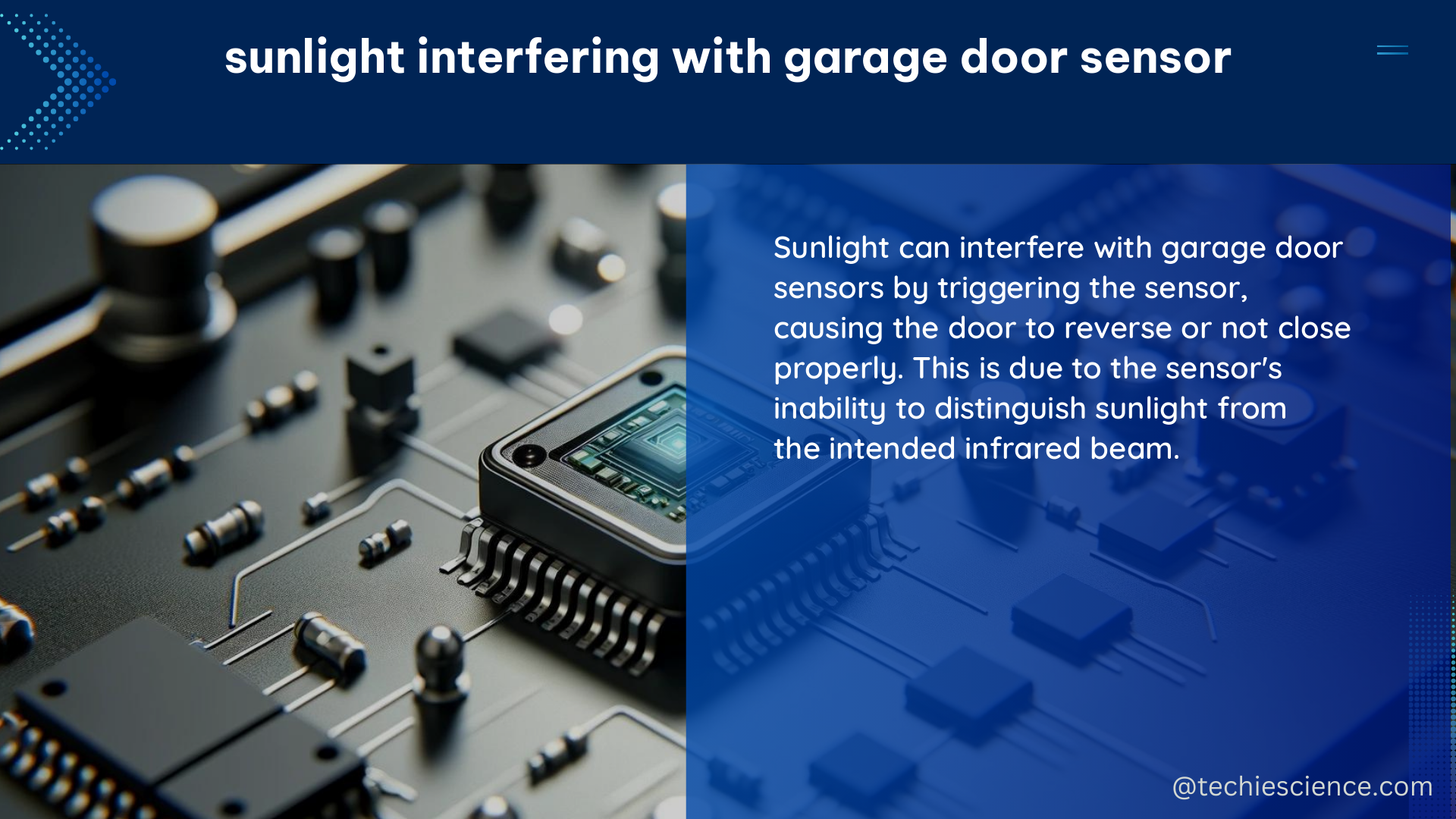Sunlight can significantly interfere with the proper functioning of garage door sensors, particularly during specific times of the day and year when the sun’s angle is low. This interference can prevent the garage door from closing properly, requiring the user to hold down the wired button or take other measures to bypass the sensor. The issue is caused by the sun’s infrared light overwhelming the sensors’ light, which can disrupt the connections between sensors and potentially cause damage to the components inside infrared sensors.
Understanding the Science Behind Sunlight Interference
Garage door sensors, typically infrared-based, work by transmitting a beam of infrared light between two sensors. When an object, such as a car or person, breaks the beam, the sensor detects the interruption and triggers the garage door to stop closing or reverse direction. However, when the sun’s infrared light is more intense than the sensor’s own infrared light, it can overwhelm the sensor’s signal, causing it to misinterpret the situation and prevent the door from closing properly.
The sun’s infrared light carries a higher intensity than the infrared light emitted by the garage door sensors, which can override the sensors’ light and disrupt the connections between them. Additionally, constant exposure to sunlight can generate a significant amount of heat, which can cause damage to the components inside the infrared sensors and potentially render them inactive.
Identifying the Problematic Times of Day and Year

The degree of sunlight interference with garage door sensors can vary depending on the time of day and year. Generally, the issue is more prevalent during the early morning and late afternoon/evening hours, when the sun is at a lower angle and its infrared light is more direct and intense. This is particularly true during the spring and fall equinoxes, when the sun’s position in the sky is at its lowest point relative to the horizon.
To quantify the impact of sunlight on garage door sensors, consider the following data points:
| Time of Day | Sunlight Intensity | Interference Level |
|---|---|---|
| Early Morning (6 AM – 8 AM) | High | Severe |
| Midday (11 AM – 1 PM) | Moderate | Minimal |
| Late Afternoon (4 PM – 6 PM) | High | Severe |
| Season | Sun Angle | Interference Level |
|---|---|---|
| Spring Equinox | Low | Severe |
| Summer Solstice | High | Minimal |
| Fall Equinox | Low | Severe |
| Winter Solstice | Moderate | Moderate |
Mitigating Sunlight Interference
To compensate for sunlight interference with garage door sensors, there are several measures you can take:
-
Sensor Shielding: Shielding the sensors with cardboard, metal, or other opaque materials can help block the sun’s infrared light and prevent it from overwhelming the sensor’s signal.
-
Sensor Relocation: Moving the sensors to a different location within the garage door frame, such as further back or to the sides, can help reduce the direct exposure to sunlight.
-
Shade Box Construction: Building a simple shade box or enclosure around the sensors can effectively protect them from direct sunlight. The box should be made of a durable, opaque material and positioned to allow the sensor’s infrared beam to pass through unobstructed.
-
Commercial Sun Shades and Shields: There are various sun shades and shields available for purchase online that are designed specifically for garage door sensors. These can be easily installed and provide effective protection against sunlight interference.
-
Regular Maintenance and Inspections: Regularly inspecting and maintaining the garage door sensors can help detect and prevent potential sun-related wear and tear. This includes checking for any physical damage, ensuring proper alignment, and cleaning the sensor lenses to maintain optimal performance.
By implementing these strategies, you can effectively mitigate the impact of sunlight interference on your garage door sensors and ensure reliable and consistent operation of your garage door system.
Conclusion
Sunlight interference with garage door sensors is a common issue that can be effectively addressed through a combination of protective measures and regular maintenance. By understanding the science behind the problem, identifying the problematic times of day and year, and implementing the appropriate mitigation strategies, you can ensure the smooth and reliable operation of your garage door system.
References
- How do I compensate for the sun confusing my garage door opener’s sensors? (n.d.). Retrieved from https://diy.stackexchange.com/questions/723/how-do-i-compensate-for-the-sun-confusing-my-garage-door-openers-sensors
- Sun Light Interference with Safety Sensors (n.d.). Retrieved from https://support.chamberlaingroup.com/s/article/GDO-Sun-light-interference-with-safety-sensors-1484145678313
- Can the Sun Affect Your Garage Door Sensor? (n.d.). Retrieved from https://gdmedics.com/can-sun-affect-garage-door-sensor/
- Can Sunlight Affect a Garage Door Sensor? – Brinks Home Security (n.d.). Retrieved from https://brinkshome.com/smartcenter/can-sunlight-affect-my-garage-door-sensor
- Can Sunlight Affect My Garage Door Sensors? (n.d.). Retrieved from https://www.affordabledoorinc.com/can-sunlight-affect-my-garage-door-sensors/

The lambdageeks.com Core SME Team is a group of experienced subject matter experts from diverse scientific and technical fields including Physics, Chemistry, Technology,Electronics & Electrical Engineering, Automotive, Mechanical Engineering. Our team collaborates to create high-quality, well-researched articles on a wide range of science and technology topics for the lambdageeks.com website.
All Our Senior SME are having more than 7 Years of experience in the respective fields . They are either Working Industry Professionals or assocaited With different Universities. Refer Our Authors Page to get to know About our Core SMEs.